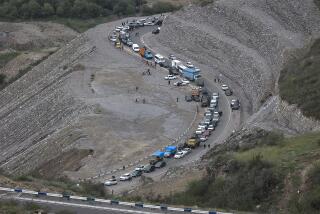‘The War Is Over,’ Lebed Says as Chechen Accord Signed
- Share via
MOSCOW — Russian peacemaker Alexander I. Lebed and separatist fighters in Chechnya agreed early today to end 20 months of combat with a promise to postpone for five years a decision on the republic’s independence--the separatists’ main demand and the cause of the war here.
“The war is over. That’s it. We’ve had enough of fighting,” a triumphant Lebed said after midnight as he and Chechen military chief of staff Aslan Maskhadov signed two documents that made formal the deal they had struck in nine hours of talks just outside Chechnya.
“I can tell the soldiers’ mothers that soldiers and civilians are not dying on Chechen territory,” Lebed declared.
A largely Chechen crowd cheered in response: “Lebed for president!” “Lebed’s a real man!” and “Long live Lebed!”
The negotiators--both soldiers-turned-doves who have pushed their own reluctant colleagues into accepting unpalatable compromises in a determined search for peace--were eager to reach their deal in order to keep the momentum going in the settlement process Lebed launched this month.
Their accord goes further than any previous agreement reached in this conflict, launched by Russia in December 1994 to crush Chechnya’s separatist ambitions. It is the first to call for a complete withdrawal of Russian troops from the tiny southern republic.
But the accord does not mention a troop withdrawal deadline and is so vague it leaves plenty of scope for renewed conflict. It also remains unclear what reception the plan will get among hard-liners who wield considerable power on both sides.
And there was no indication how it will be received by Russian President Boris N. Yeltsin, who will have the final say.
Lebed initially received hazy but sweeping instructions from Yeltsin to negotiate a Chechen peace. But Yeltsin, on vacation outside Moscow amid repeated suggestions his health is failing, has since remained aloof from his envoy.
A member of Lebed’s delegation said the security chief had been in contact with Moscow throughout the talks but did not say with whom. Prime Minister Viktor S. Chernomyrdin said Friday that the plan had been “coordinated” with the president.
Maskhadov praised Lebed’s effort to end a war that has killed more than 30,000 and seen cease-fires come and go. “We could have ended the war long ago, but only now has a politician emerged who was capable of ending the bloodiest chapter in the history of the Chechen republic,” he said.
Under the agreement, the decision on Chechnya’s political status was delayed until Dec. 31, 2001. “Then, with cool heads, calmly and soberly, we will sort out our relations,” Lebed said.
*
This was a crucial concession both by the separatists, who acknowledged for the first time that they could not win independence by war, and by Russia, which acknowledged for the first time that it might be prepared, later, to contemplate Chechnya’s breaking away from the Russian Federation.
News agencies reporting from the town of Khasavyurt, where the talks were held, did not make clear whether the negotiators had backed away from an earlier Lebed proposal for a referendum among Chechens on their independence.
No details were released of Lebed’s and Maskhadov’s views on how Chechnya should be ruled over the next five years. But the two men agreed to set up a commission to work out proposals for financial relations between Russia and Chechnya, as well as a program for the region’s postwar reconstruction.
The accord was built on a week-old cease-fire that so far has largely been observed. Under that agreement, a pullout of 11,000 or so Russian troops from Chechnya’s ruined capital, Grozny, has begun and is expected to be completed later today.
Chechen fighters who took control of large areas of Grozny this month must also withdraw, leaving the city controlled by joint military patrols of 250 soldiers from each side.
Russian troops are to remain stationed in five camps in Chechnya until a later agreement on their withdrawal from the region. Today’s agreement said that withdrawal will be monitored by the joint commission, which is to be set up by Oct. 1.
Until the Russian troops are gone, however, the cease-fire could break down, and Lebed had said before today’s round of talks that his goal was “a large political step” toward peace.
More to Read
Sign up for Essential California
The most important California stories and recommendations in your inbox every morning.
You may occasionally receive promotional content from the Los Angeles Times.













